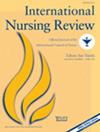COVID-19 大流行期间在长期护理机构工作的护士和护理助理的抑郁和焦虑情绪
IF 3.8
3区 医学
Q1 NURSING
引用次数: 0
摘要
目的 本研究调查了 COVID-19 大流行期间在长期护理机构工作的护士和护理助理的抑郁和焦虑程度。我们还探讨了大流行期间在长期护理机构工作的护士和护理助理抑郁和焦虑的潜在原因。 背景 COVID-19 大流行对长期护理机构产生了相当大的影响。COVID-19的高感染率和高死亡率导致护理人员的工作量增加。引言COVID-19大流行使在长期护理机构工作的护理人员面临更高的焦虑和抑郁风险。此外,工作环境中的高感染风险以及对将 COVID-19 传播给家庭成员和长期护理机构居民的担忧也给护理人员带来了各种形式的压力。结果护士的抑郁和焦虑水平高于护理助理,但差异无统计学意义(P = 0.551)。影响护士抑郁和焦虑水平的因素包括所属机构和工作经验。就护理助理而言,年龄、婚姻状况和机构隶属关系与抑郁和焦虑水平相关。结论在大流行期间,在长期护理机构工作的护士的抑郁和焦虑水平高于护理助理。此外,还建议管理人员确保提供充足的大流行预防设备和资源。本文章由计算机程序翻译,如有差异,请以英文原文为准。
Depression and anxiety between nurses and nursing assistants working in long‐term care facilities during the COVID‐19 pandemic
AimThis study investigated the levels of depression and anxiety in nurses and nursing assistants working in long‐term care facilities during the COVID‐19 pandemic. We also explored the potential causes of depression and anxiety in nurses and nursing assistants working in long‐term care facilities during the pandemic.BackgroundThe COVID‐19 pandemic has had a considerable impact on long‐term care facilities. The high infection and mortality rates for COVID‐19 have resulted in an increased workload for caregivers.IntroductionThe COVID‐19 pandemic exposed caregivers working in long‐term care facilities to higher risks of anxiety and depression. Additionally, the high risk of infection in the work environment and concerns about spreading COVID‐19 to family members and long‐term care facility residents led to various forms of stress among caregivers.MethodsThe present study was a cross‐sectional study. Questionnaires were used to investigate depression and anxiety among regarding nurses and nursing assistants working in long‐term care facilities during the pandemic.ResultsThe depression and anxiety levels of the nurses were higher than nursing assistants, but had no statistically significant difference (p = 0.551). The factors influencing levels of depression and anxiety in nurses contained facility affiliation and experience working. In terms of nursing assistants, age, marital status, and facility affiliation were correlated with the levels of depression and anxiety.DiscussionThe pandemic has severely impacted caregivers. In the process of implementing pandemic prevention measures and providing care for COVID‐19 patients, safeguarding the psychological health of caregivers is also essential.ConclusionThe levels of depression and anxiety in nurses were higher than in nursing assistants working in long‐term care facilities during the pandemic.Implication for nursing and health policyLong‐term care facilities managers are recommended to enhance the education and training process for caregivers. Managers are also recommended to ensure provision of sufficient amounts of pandemic prevention equipment and resources.
求助全文
通过发布文献求助,成功后即可免费获取论文全文。
去求助
来源期刊
CiteScore
7.90
自引率
7.30%
发文量
72
审稿时长
6-12 weeks
期刊介绍:
International Nursing Review is a key resource for nurses world-wide. Articles are encouraged that reflect the ICN"s five key values: flexibility, inclusiveness, partnership, achievement and visionary leadership. Authors are encouraged to identify the relevance of local issues for the global community and to describe their work and to document their experience.

 求助内容:
求助内容: 应助结果提醒方式:
应助结果提醒方式:


